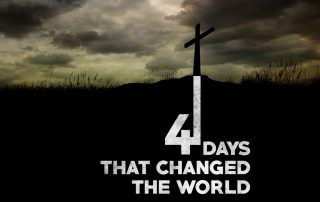13 Now who is there to harm you if you are zealous for what is good? 14 But even if you should suffer for righteousness’ sake, you will be blessed. Have no fear of them, nor be troubled, 15 but in your hearts honor Christ the Lord as holy, always being prepared to make a defense to anyone who asks you for a reason for the hope that is in you; yet do it with gentleness and respect, 16 having a good conscience, so that, when you are slandered, those who revile your good behavior in Christ may be put to shame. 17 For it is better to suffer for doing good, if that should be God’s will, than for doing evil. 18 For Christ also suffered once for sins, the righteous for the unrighteous, that he might bring us to God, being put to death in the flesh but made alive in the spirit, 19 in which he went and proclaimed to the spirits in prison, 20 because they formerly did not obey, when God’s patience waited in the days of Noah, while the ark was being prepared, in which a few, that is, eight persons, were brought safely through water. 21 Baptism, which corresponds to this, now saves you, not as a removal of dirt from the body but as an appeal to God for a good conscience, through the resurrection of Jesus Christ, 22 who has gone into heaven and is at the right hand of God, with angels, authorities, and powers having been subjected to him.
The suffering Jesus experienced on the cross was unfathomable. The beatings and torment, if done publicly now as it was then, would be met with severe protests, sanctions, and other means to expel it from the arena of punishment. But, 2000 years ago, being crucified wasn’t uncommon. Jesus’ ministry happened in a very different time and place, and Jesus suffered in many ways similar to the average person. We read of his humble beginnings, how he was born under questionable circumstances, and his crucifixion where he suffered under the religious crowd of the day. And, those who were walking with Jesus, being in his presence, saw Jesus endure suffering like theirs.
Today, we think suffering is different. As we go through our lives, we put up with what we determine to be suffering, and doubt the presence of Christ during our suffering. Peter writes of the suffering Jesus endured, and he tells us that it is better to suffer for doing good than evil. But we think we’re alone in the middle of our suffering. We may be disappointed when we don’t experience relief in the way we expect. Maybe we think suffering is something we shouldn’t experience because living as a Christian is the good life, isn’t it?
In Luke 8, there are three stories about suffering on tragic levels. A man is possessed by so many demons they referred to themselves as ‘Legion’. Jesus speaks, and we see the man returned to his former peaceful self. A woman with a 12-year blood disorder, who has suffered cultural rejection, has a humble faith which leads to her healing in a crowd of suffering people. Perhaps the most difficult story, at least for me, is the well-respected father watching his young daughter die. He humbles himself by falling at Jesus’ feet, begging for the life of his daughter. Jesus was very present with these three, healing their suffering. But we also see his presence in the crowd, with them pressing in on him. He doesn’t heal them all. His presence doesn’t always bring an alleviation of suffering.
Psalm 118:5-8 shows us our fears about suffering at the hands of others are powerless. As you read this passage, imagine yourself as the person crying out.
5 Out of my distress I called on the Lord;
the Lord answered me and set me free.
6 The Lord is on my side; I will not fear.
What can man do to me?
7 The Lord is on my side as my helper;
I shall look in triumph on those who hate me.
Psalm 118:5-7
How do these words speak to you? Can you find comfort in them? Why or why not? Contemplate this portion of scripture and reflect upon the suffering in your own life. Is it possible for you to release your fear regarding suffering and embrace Jesus who identifies with you in your suffering?
By Rich Obrecht




